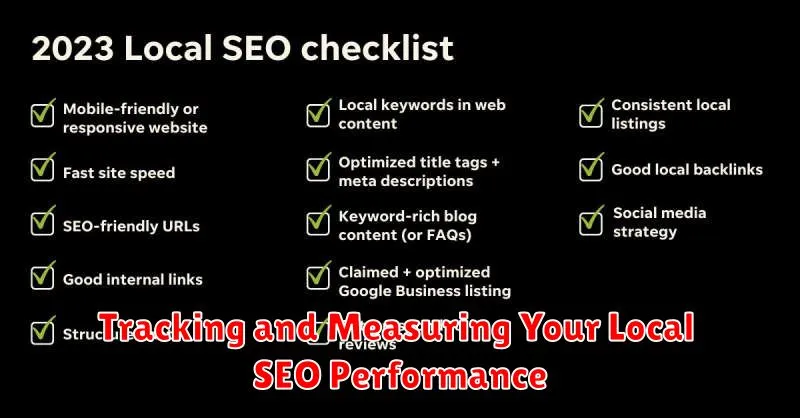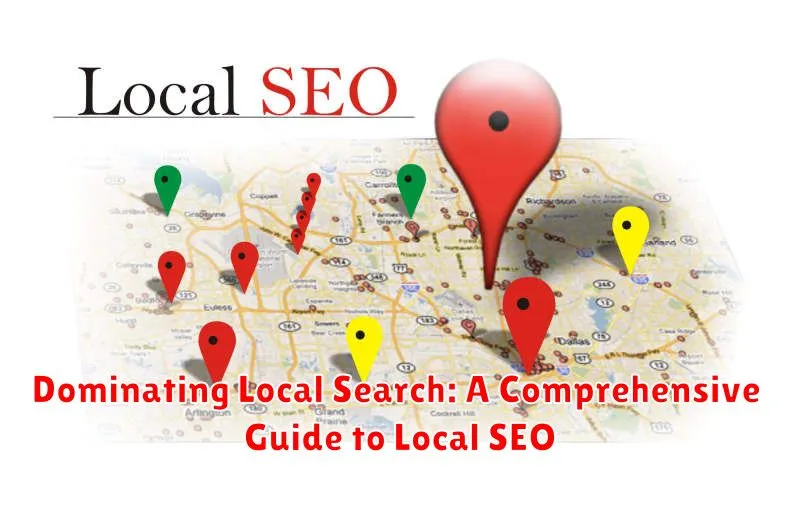In today’s digital landscape, local search engine optimization (SEO) is more critical than ever for businesses seeking to thrive. For businesses targeting a local customer base, appearing prominently in local search results is paramount to success. This comprehensive guide delves into the intricacies of local SEO, providing actionable strategies to help your business dominate local search rankings and attract more customers. From optimizing your Google Business Profile to building citations and managing online reviews, we’ll cover everything you need to know to establish a powerful local search presence and achieve sustainable growth.
This guide will equip you with the knowledge and tools to conquer the local search arena. We’ll explore fundamental concepts such as keyword research for local SEO, on-page optimization techniques, and the importance of building local citations. We’ll also discuss advanced strategies like leveraging schema markup, managing your online reputation, and tracking your local SEO performance. Whether you’re a seasoned marketer or just starting, this comprehensive guide will provide valuable insights to help you achieve local search dominance and drive more business to your door.
Understanding Local SEO and Its Benefits
Local SEO is the practice of optimizing your online presence to attract more business from relevant local searches. These searches often occur on search engines like Google but also extend to platforms like Yelp, Apple Maps, and other online directories.
Visibility is a key benefit of local SEO. When potential customers search for businesses like yours in your area, a strong local SEO strategy will place you higher in search results and map listings, increasing your chances of being discovered.
Targeted Traffic is another important advantage. Local SEO helps connect your business with customers actively seeking products or services near them. This results in higher quality leads compared to generic online traffic.
Increased Website Traffic also stems from improved local search visibility. A well-optimized online profile drives more visitors to your website, where they can explore your offerings in detail and potentially convert into paying customers.
Ultimately, effective local SEO leads to Business Growth by helping you connect with a larger audience within your target market, driving foot traffic, and generating more leads and sales.
Optimizing Your Google My Business Profile
Your Google My Business (GMB) profile is the cornerstone of your local SEO strategy. A fully optimized GMB profile helps you rank higher in local search results and provides crucial information to potential customers.
Key elements of GMB optimization include:
- Accurate and Consistent NAP Information: Ensure your Name, Address, and Phone number (NAP) are consistent across your website and all online platforms.
- Choosing the Right Categories: Select the most relevant categories for your business to improve discoverability.
- Writing a Compelling Business Description: Highlight your unique selling points and target keywords relevant to your products or services.
- Adding High-Quality Photos: Showcase your business with appealing visuals of your storefront, products, and team.
- Encouraging and Responding to Reviews: Positive reviews build trust and credibility. Respond to both positive and negative reviews professionally and promptly.
- Utilizing GMB Posts: Share updates, offers, and events to engage with your audience.
Regularly updating and monitoring your GMB profile is essential to maintain accuracy and relevance. This will ensure potential customers can easily find and connect with your business.
Building Local Citations and Directory Listings
Local citations are online mentions of your business’s name, address, and phone number (NAP). Consistency across these citations is crucial for local SEO. Search engines use this information to verify the legitimacy and location of your business.
Start by claiming and optimizing your listings on core platforms like Google My Business, Bing Places for Business, and Apple Maps. Ensure your NAP data is accurate and identical across all platforms.
Next, focus on building citations on industry-specific directories and local business directories. Examples include Yelp, TripAdvisor, and industry-specific platforms relevant to your business. Consider niche directories specific to your city or region.
Data aggregators play a significant role in distributing your business information. Submitting your data to major data aggregators like Data Axle and Neustar Localeze can help spread your citations across various online platforms.
Regularly audit your citations to ensure accuracy and identify any duplicate or incorrect listings. Maintaining consistent and accurate citations is an ongoing process essential for strong local search visibility.
Managing Online Reviews and Reputation
Online reviews are crucial for local SEO. They directly influence consumer trust and search rankings. Actively managing your online reputation involves several key strategies.
Monitor review platforms: Regularly check popular platforms like Google, Yelp, and industry-specific sites for new reviews. Set up alerts to be notified immediately when a new review is posted.
Respond to reviews: Engage with both positive and negative reviews. Thank customers for positive feedback. Address negative reviews politely and professionally, offering solutions or seeking to understand the issue. Publicly acknowledging concerns demonstrates responsiveness and builds trust.
Encourage reviews: Make it easy for satisfied customers to leave reviews. Provide clear instructions or direct links to your preferred review platforms. Consider including a call to action in email signatures or on receipts.
Address negative feedback offline: If a negative review raises serious concerns, attempt to contact the customer directly. Moving the conversation offline can help resolve issues and potentially lead to a revised review.
Creating Location-Specific Content
Location-specific content is crucial for attracting local customers. This involves creating content that resonates with your target audience in a specific geographic area. By focusing on local themes, events, and news, you can demonstrate relevance to local search engines and potential customers.
Keywords play a vital role in location-specific content. Integrate location-based keywords naturally within your website copy, blog posts, and other online content. For example, if you own a bakery in San Francisco, use phrases like “best sourdough bread in San Francisco” or “San Francisco birthday cakes.” Avoid keyword stuffing, which can negatively impact your SEO.
Neighborhood guides are an excellent way to engage local audiences. Create detailed guides highlighting local attractions, restaurants, and points of interest near your business. This showcases your local expertise and provides valuable information for residents and visitors.
Blog posts offer another avenue for local content creation. Cover local events, news, or community happenings relevant to your business. This keeps your content fresh and demonstrates your involvement in the community.
Leveraging Local Keywords and On-Page Optimization
Local keywords are the cornerstone of effective local SEO. They’re the search terms people use to find businesses like yours in a specific geographic area. Think “Italian restaurant Chicago” or “best plumber in Denver.” Integrating these keywords strategically within your website content is crucial.
On-page optimization focuses on making your website easily understandable for both search engines and users. This involves optimizing various elements:
- Title tags and meta descriptions: Accurately reflect your business and location, incorporating relevant local keywords.
- Header tags (H1-H6): Structure your content logically, using local keywords where appropriate.
- Content optimization: Naturally weave local keywords into your website copy, providing valuable information to users.
- Name, Address, and Phone Number (NAP) consistency: Ensure your NAP information is consistent across your website and online directories.
By focusing on these key elements, you can significantly improve your website’s visibility in local search results.
Mobile Optimization for Local Search
In today’s mobile-first world, optimizing your online presence for mobile devices is crucial for local search success. A mobile-friendly website is no longer a luxury, but a necessity. Users are constantly searching for local businesses on their smartphones, and if your website isn’t optimized for mobile, you’re missing out on valuable leads and potential customers.
Page speed is paramount. Mobile users expect fast-loading websites. A slow-loading site can lead to high bounce rates and a negative user experience, ultimately hurting your local search rankings. Ensure your website is optimized for speed by compressing images, leveraging browser caching, and minimizing HTTP requests.
Responsive design is essential for providing a seamless user experience across different screen sizes. A responsive website automatically adjusts its layout and content to fit the device it’s being viewed on, whether it’s a smartphone, tablet, or desktop computer.
Consider implementing click-to-call functionality. This allows mobile users to easily contact your business directly from the search results page with a single tap. This convenient feature can significantly improve conversion rates.
Tracking and Measuring Your Local SEO Performance

Tracking your local SEO performance is crucial to understanding what’s working and what needs improvement. Key performance indicators (KPIs) provide valuable insights into your strategy’s effectiveness.
Website traffic from local searches is a fundamental metric. Monitor increases or decreases in organic traffic specifically from local users. Conversion rates are equally vital. Track how many local visitors complete desired actions, such as making a purchase or filling out a contact form.
Keyword rankings in local search results are another important factor. Track your rankings for relevant local keywords to assess your visibility. Local citation consistency is also critical. Ensure your business information is accurate and consistent across various online directories.
Finally, pay attention to online reviews and ratings. Monitor platforms like Google My Business and Yelp for feedback and address any negative reviews promptly.
Staying Ahead of the Curve: Future Trends in Local SEO

The local SEO landscape is constantly evolving. Staying ahead requires anticipating and adapting to emerging trends. Voice search continues its rise in popularity, demanding conversational keyword optimization. Businesses need to answer questions users are likely to ask verbally.
AI-powered personalization is another significant trend. Search engines are getting better at understanding user intent and delivering hyper-localized results. This necessitates focusing on structured data and ensuring accuracy in business information.
Augmented Reality (AR) is poised to impact local search. AR overlays digital information onto the real world, offering immersive experiences for potential customers. Businesses that leverage AR early can gain a competitive edge.
Finally, the importance of local reviews and reputation management cannot be overstated. Proactive solicitation and management of online reviews will be even more crucial for local visibility.

